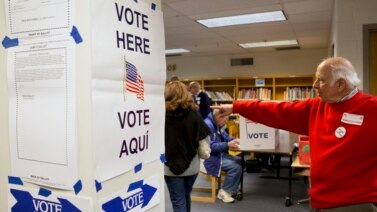Election officials in the United States are working to stop threats to the election system from cyber attackers.
And Democrats in Congress are calling on the Federal Bureau of Investigation to investigate reports that Russia may be planning to try to affect the presidential election in November.
Senate Minority Leader Harry Reid recently sent a letter to FBI Director James Comey.
The letter said the threat of Russia tampering with the elections “is more extensive than widely known. ...The prospect of a hostile government actively seeking to undermine our free and fair elections represents one of the gravest threats to our democracy since the Cold War.”
Four senior House Democrats asked the FBI to investigate officials in the campaign of Republican presidential nominee Donald Trump.
In a letter, the representatives said they want to know if the officials worked with Russia to carry out recent attacks against the Democratic National Committee and Democratic Congressional Campaign Committee to “interfere with the U.S. presidential election.”
Russian government involved?
News reports said American officials believe Russian hackers illegally entered the election systems of two states in August. The FBI has not named the states.
But Yahoo News, which first reported the hacks, reported that its sources said the states were Arizona and Illinois. The website reported that an Illinois election official said the voter registration system was shut down for 10 days after hackers gathered information about 200,000 voters. In the Arizona attack, harmful software was placed into the voter registration system.
Russia has said its government officials were not involved in the attacks on the Democratic party organizations or the states.
Electronic voting vulnerable
Federal officials are increasingly worried about the possibility that foreign hackers -- particularly those working for Russia -- could enter the computer systems of American states and disrupt the presidential election.
Timothy Carone works at the Mendoza College of Business at the University of Notre Dame. In an interview with VOA, he said he believes “this election will probably start to showcase the future around problems we’ll have with electronic voting.”
Tim Erlin is the senior director of information technology security and risk strategy at Tripwire, a cybersecurity company. He said he believes cyber attacks will take place during the election in November.
“There have already been cyber security incidents related to the election, so the likelihood that this election will be influenced in some way by attacks is 100 percent,” he said.
James Andrew Lewis works at the Center for Strategic and International Studies, a public policy research group in Washington. He told VOA that “hacking for political purposes or coercive purposes [is] new and dangerous.”
Lewis said Russian hackers are skilled. He said the recent reported cyber attacks may be taking place in preparation for the election in November. "That might suggest that, if they wanted to, they could do something -- a lot more at election time,” he said.
Lewis believes it would be difficult for the hackers to change the result of an election. That is because, he said, cyber attackers would have to illegally enter a large number of local, computerized voting machines. But he said it is possible that people could doubt the result of the election if the hackers are able to illegally enter state voting systems that combine vote totals from towns and cities.
Lewis said it is more likely that the hackers will attack wireless voting machines. If they do, he said, it may cause people to not believe the reported vote totals.
“It’s something to be worried about for November,” he said.
Stepped-up security
Federal agencies are increasing the strength of their computer security systems to prepare for the November 8 elections. And they are working with the states as they do the same.
The Department of Homeland Security, the U.S. Election Assistance Commission, the National Institute for Standards and Technology and the Department of Justice are helping state officials limit the threats to their voting systems.
Homeland Security Secretary Jeh Johnson spoke with federal and state officials about election security. He said “it is critically important to continue to work to ensure the security and resilience of our electoral infrastructure, particularly as the risk environment evolves.”
Harvey Kushner is the director of the Homeland Security and Terrorism Institute at Long Island University. He has trained workers at federal agencies, including the FBI and the Department of Homeland Security.
He told VOA “the government has not been very sophisticated in dealing with cyberspace.” He noted the problems several years ago with the website of the Affordable Health Care Act. The website had many problems when it was first introduced.
But Lewis says the federal government has many ways to fight cyber attacks. In addition to the FBI’s “counterhacking capabilities,” the government has a large intelligence-gathering network and works with private cyber security companies.
“So between the private companies and forensic evidence and the federal government and intelligence activity, you can very often be pretty sure about whoas doing what,” he said.
Timothy Carone says officials are working hard to stop cyber attacks during the elections, but he says they cannot stop them all. He says attacks are “going to happen, and how we recover from it is going to be a challenge.”
Tim Erlin says the most effective approach to stopping cyber attacks is to identify possible threats and put defenses in place to guard against them.
Other cyber security experts say election officials must have other ways in place to record votes, including paper ballots.
I’m Dorothy Gundy.
And I'm Bryan Lynn.
VOA News reported this story from Washington. Christopher Jones-Cruise adapted it for VOA Learning English. Jill Robbins was the editor.
We want to hear from you. Write to us in the Comments Section, or visit our Facebook page.
Words in This Story
cyber - adj. related to computer networks
tamper with - phrasal verb. to change or touch (something) especially in a way that causes damage or harm
prospect - n. the possibility that something will happen in the future
undermine - v. to make (someone or something) weaker or less effective usually in a secret or gradual way
hacker - computers. a person who secretly gets access to a computer system in order to get information or cause damage
disrupt - v. to cause (something) to be unable to continue in the normal way; to interrupt the normal progress or activity of (something)
showcase - v. to show (something or someone) in an attractive or favorable way
cyber security - n. the state of being protected against the criminal or unauthorized use of electronic data, or the measures taken to achieve this.
coercive - adj. using force or threats to make someone do something; using coercion
institute - n. an organization created for a particular purpose (such as research or education)
resilience - n. the ability to become strong, healthy or successful again after something bad happens
sophisticated - adj. having or showing a lot of experience and knowledge
counterhack - v. to attack the computers of hackers
capability - adj. the ability to do something
forensic - adj. relating to the use of scientific knowledge or methods in solving crimes

